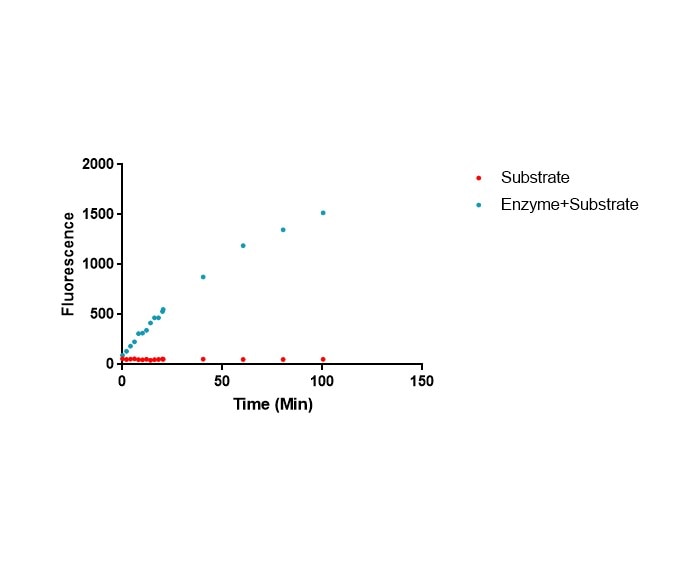Recombinant Human His6-USP8 Protein, CF Summary
Product Specifications
Met1 - Thr1118 (Pro2Gly, Val4Ala & V257Ala) with a N-terminal 6-His tag
Product Datasheets
Carrier Free
CF stands for Carrier Free (CF). We typically add Bovine Serum Albumin (BSA) as a carrier protein to our recombinant proteins. Adding a carrier protein enhances protein stability, increases shelf-life, and allows the recombinant protein to be stored at a more dilute concentration. The carrier free version does not contain BSA.
In general, we advise purchasing the recombinant protein with BSA for use in cell or tissue culture, or as an ELISA standard. In contrast, the carrier free protein is recommended for applications, in which the presence of BSA could interfere.
E-520
| Formulation | Supplied as a solution in HEPES, NaCl and TCEP. |
| Shipping | The product is shipped with dry ice or equivalent. Upon receipt, store it immediately at the temperature recommended below. |
| Stability & Storage: | Use a manual defrost freezer and avoid repeated freeze-thaw cycles.
|
Reconstitution Calculator
Background: USP8
Ubiquitin Specific Peptidase 8 (USP8), also known as Ubiquitin Isopeptidase Y (UBPY), is a widely expressed deubiquitinating enzyme belonging to the peptidase C19 family. It has a predicted molecular weight of 127.5 kDa (1). Human USP8 is 1118 amino acids (aa) in length and shares 84% aa sequence identity with the mouse and rat orthologs (2). It contains an N-terminal MIT domain (aa 33-116) that mediates endosomal localization, CHMP-binding, and maintenance of ESCRT-0 (3). USP8 also has a rhodanese domain (aa 181-319) that binds NRDP1 Ubiquitin ligase (E3), a SH3 domain binding sequence (aa 405-413), and a C-terminal catalytic domain (aa 734-1110) (2,4). USP8 is a growth-regulated enzyme that controls the internalization and endocytic trafficking of cell surface receptors (1,5). Some receptors are targeted for internalization and degradation by ubiquitination. USP8 has been shown to disrupt the down-regulation of multiple receptors, including EGF R/ErbB1, ErbB2/Her2, and Smoothened, via their deubiquitination (6-9). Conversely, USP8 appears to have the opposite effect on the trafficking of CXCR4, PAR2, and the δ-opioid receptor (10-12). Depletion or catalytic inactivation of USP8 stabilized their expression (10-12). It is thought that deubiquitination of these receptors down-stream of the sorting endosome commits them to lysosomal degradation (10). USP8 can be phosphorylated at Ser680 allowing for 14-3-3-epsilon binding, which subsequently inhibits USP8 activity (13). Additionally, USP8 undergoes tyrosine phosphorylation at its N-terminus following EGF activation of the EGF R/ErbB1 / ErbB2/Her2 receptor complex (7).
- Naviglio, S et al. (1998) EMBO J. 17:3241.
- Avvakumov, G.V. et al. (2006) J. Biol. Chem. 281:38061.
- Row, P.E. et al. (2007) J. Biol. Chem. 282:30929.
- Kato, M. et al. (2000) J. Biol. Chem. 275:37481.
- Wright, M.H. et al. (2011) Cell Biochem. Biophys. 60:39.
- Mizuno, E. et al. (2005) Mol. Biol. Cell 16:5163.
- Meijer, I. M. and J.E. van Leeuwen (2011) Cell. Signal. 23:458.
- Xia, R. et al. (2012) PLoS Biol. 10:e1001238.
- Li, E. et al. (2012) PLoS Biol. 10:e1001239.
- Hislop, J.N. et al. (2009) J. Biol. Chem. 284:19361.
- Hasdemir, B. et al. (2009) J. Biol. Chem. 284:28453.
- Berlin, I. et al. (2010) J. Biol. Chem. 285:37895.
- Mizuno, E. et al. (2007) Exp. Cell Res. 313:3624.
Citations for Recombinant Human His6-USP8 Protein, CF
R&D Systems personnel manually curate a database that contains references using R&D Systems products. The data collected includes not only links to publications in PubMed, but also provides information about sample types, species, and experimental conditions.
2
Citations: Showing 1 - 2
Filter your results:
Filter by:
-
DNA damage shifts circadian clock time via Hausp-dependent Cry1 stabilization.
Authors: Papp, Stephani, Huber, Anne-Lau, Jordan, Sabine D, Kriebs, Anna, Nguyen, Madelena, Moresco, James J, Yates, John R, Lamia, Katja A
Elife, 2015-03-10;4(0):.
Species: Human
Sample Types: Whole Cells
Applications: Bioassay -
A selective USP1-UAF1 inhibitor links deubiquitination to DNA damage responses.
Authors: Liang, Qin, Dexheimer, Thomas S, Zhang, Ping, Rosenthal, Andrew S, Villamil, Mark A, You, Changjun, Zhang, Qiuting, Chen, Junjun, Ott, Christin, Sun, Hongmao, Luci, Diane K, Yuan, Bifeng, Simeonov, Anton, Jadhav, Ajit, Xiao, Hui, Wang, Yinsheng, Maloney, David J, Zhuang, Zhihao
Nat Chem Biol, 2014-02-16;10(4):298-304.
Applications: Bioassay
FAQs
No product specific FAQs exist for this product, however you may
View all Proteins and Enzyme FAQsReviews for Recombinant Human His6-USP8 Protein, CF
Average Rating: 5 (Based on 1 Review)
Have you used Recombinant Human His6-USP8 Protein, CF?
Submit a review and receive an Amazon gift card.
$25/€18/£15/$25CAN/¥75 Yuan/¥2500 Yen for a review with an image
$10/€7/£6/$10 CAD/¥70 Yuan/¥1110 Yen for a review without an image
Filter by:


